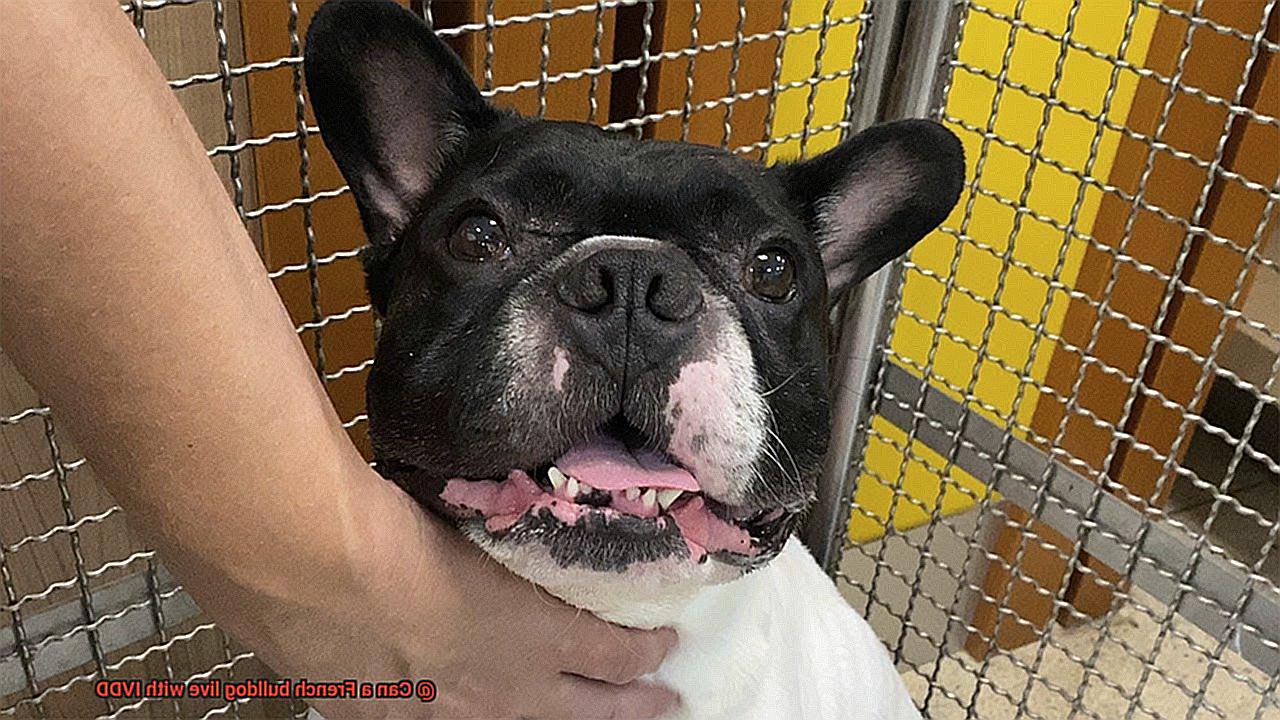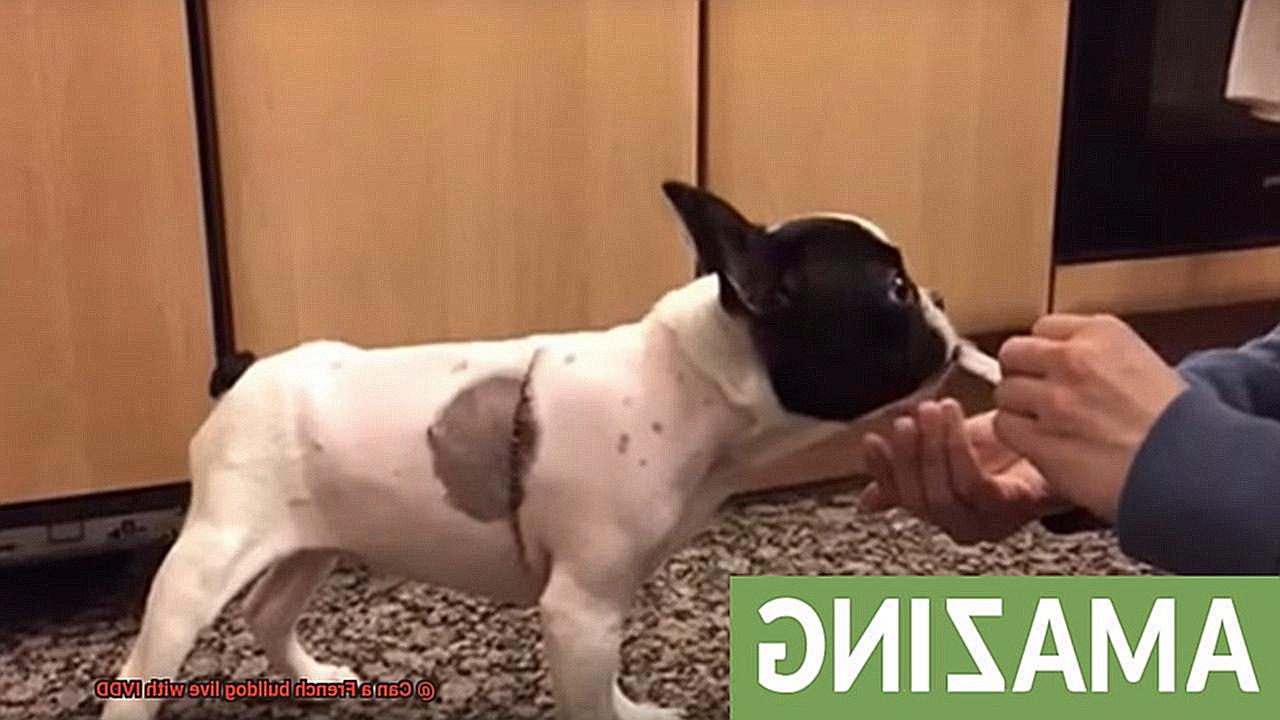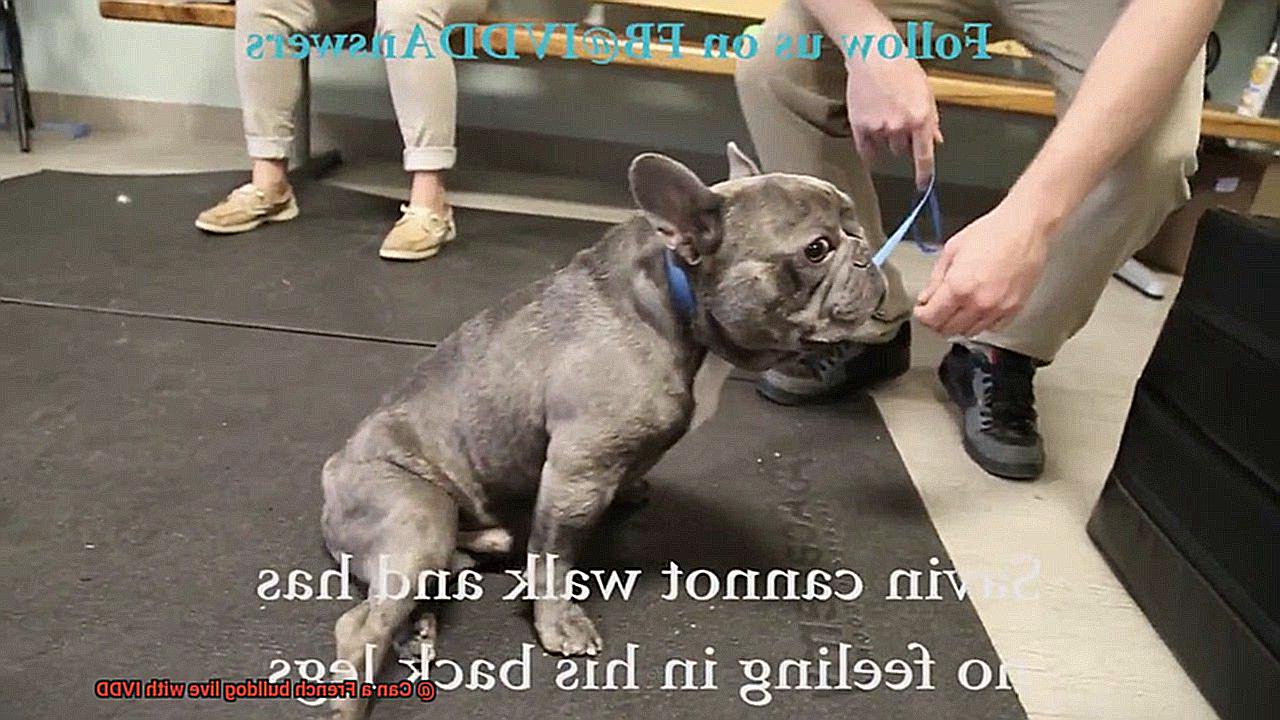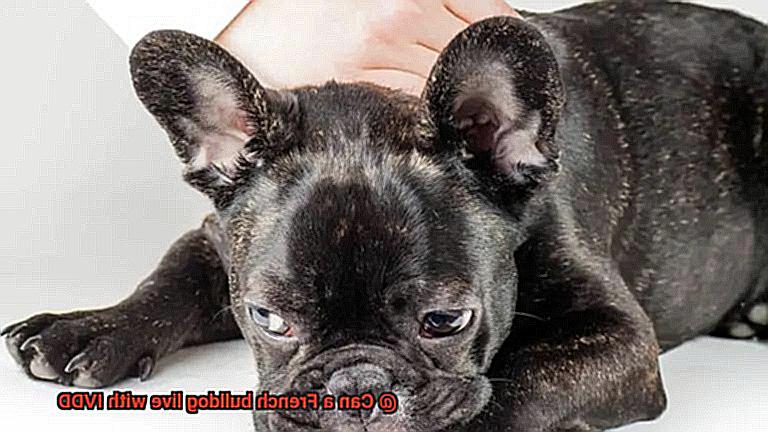Can a French bulldog live with IVDD?
French Bulldogs, with their bat-like ears and adorable snorts, have captured the hearts of dog lovers worldwide. But like any breed, they too face health challenges. One question that often puzzles pet parents is whether a French Bulldog can thrive despite Intervertebral Disc Disease (IVDD).
In this blog post, we embark on an enlightening journey through the world of IVDD and its potential impact on our furry companions. We’ll debunk common misconceptions surrounding this condition and unveil the possibilities for French Bulldogs diagnosed with IVDD.
So grab your favorite cup of coffee and join us as we explore the facts, navigate the obstacles, and uncover the potential for French Bulldogs to live long, fulfilling lives in spite of IVDD.
How is IVDD Diagnosed in French Bulldogs?
Contents
- 1 How is IVDD Diagnosed in French Bulldogs?
- 2 What are the Symptoms of IVDD in French Bulldogs?
- 3 What are the Treatment Options for IVDD in French Bulldogs?
- 4 How Can I Reduce The Risk of IVDD in My French Bulldog?
- 5 Is Surgery Necessary for IVDD Treatment in French Bulldogs?
- 6 What is the Prognosis for a French Bulldog with IVDD?
- 7 How Can I Make My Home Environment Supportive for a French Bulldog with IVDD?
- 7.1 Provide a Comfortable and Supportive Bed:
- 7.2 Create a Safe and Accessible Living Space:
- 7.3 Implement a Controlled Exercise Routine:
- 7.4 Maintain a Healthy Weight:
- 7.5 Use Harnesses Instead of Collars:
- 7.6 Provide Ample Opportunities for Mental Stimulation:
- 7.7 Consider Physical Therapy or Acupuncture:
- 8 What Should I Do if My French Bulldog Has Been Diagnosed With IVDD?
- 9 Conclusion
Unfortunately, they are also prone to certain health issues, one of which is Intervertebral Disc Disease (IVDD). This condition affects the spinal discs in their back and can cause pain, mobility issues, and even paralysis if left untreated. In this guide, we’ll walk you through the process of diagnosing IVDD in French Bulldogs, so you can ensure your furry friend gets the best care possible.
Physical Examination: The First Step
When you suspect your French Bulldog may have IVDD, the first thing to do is schedule a visit with your veterinarian. During the physical examination, the vet will carefully assess your dog’s overall health and check for any signs of pain or discomfort. They will also evaluate your Frenchie’s mobility and reflexes, paying close attention to their back and hind legs.
Imaging Techniques: Seeing What’s Going On
To get a clearer picture of what’s happening inside your dog’s spine, imaging techniques like X-rays and MRI scans are commonly used. X-rays can help identify changes in the shape or alignment of the vertebrae and any calcification or mineralization of the intervertebral discs. However, X-rays alone may not provide a definitive diagnosis in the early stages of IVDD.
MRI scans are considered the gold standard for diagnosing IVDD in French Bulldogs. This non-invasive imaging technique allows for detailed visualization of the spinal cord and intervertebral discs. It helps identify herniations or compressions accurately and determine the severity and location of the disc disease, crucial information for planning appropriate treatment.
Additional Diagnostic Procedures: Confirming IVDD
In some cases, additional diagnostic procedures may be necessary to confirm the diagnosis of IVDD. Myelography involves injecting a contrast dye into the spinal canal to enhance visualization of the spinal cord. Electromyography (EMG) measures electrical activity in the muscles and nerves, providing valuable information about the extent of nerve damage.
Seeking Expertise: The Importance of an Experienced Veterinarian
Given the unique anatomy of French Bulldogs, diagnosing IVDD can be challenging. Their brachycephalic (short-nosed) structure can make it harder to interpret imaging results accurately. Therefore, it’s crucial to consult with a veterinarian who has experience in diagnosing and treating IVDD in this breed. They will have the knowledge and expertise to guide you through the diagnostic process and recommend appropriate treatment options.

What are the Symptoms of IVDD in French Bulldogs?
This article will guide you through the symptoms of IVDD in French Bulldogs, so you can keep a close eye on your furry friend’s health and well-being. Let’s dive in.
Back Pain – The Silent Squeals:
When it comes to IVDD, back pain is often the first sign that something’s amiss. If you notice your French Bulldog flinching or whining when you touch their back or neck, it’s time to pay attention. Keep an eye out for any discomfort or sensitivity in these areas.
Wobbly Walks and Awkward Gaits:
French Bulldogs with IVDD may exhibit changes in their walking style. If your Frenchie starts wobbling or has an unsteady gait, it’s a red flag. You might even notice them dragging their hind legs or struggling to get up from a lying position. Poor little things.
Hind Leg Weakness – The Struggle is Real:
IVDD can cause weakness and loss of coordination in the hind legs of French Bulldogs. They may have difficulty jumping onto furniture or climbing stairs, and accidents in the house may become more frequent as they struggle to control their bladder or bowel movements. Hang in there, little buddies.

Paralysis – When the Legs Won’t Dance:
In severe cases, IVDD can lead to partial or complete paralysis in French Bulldogs. This means their hind legs lose all motor function, leaving them unable to walk or move them at all. It’s heart-wrenching to see our furry companions go through this, so let’s do everything we can to prevent it.
Other Telltale Signs:
French Bulldogs with IVDD may also experience muscle spasms, yelping or crying out in pain, and a hunched back posture. Keep an eye out for these additional symptoms to provide your furry friend with the care they need.
What are the Treatment Options for IVDD in French Bulldogs?
French Bulldogs are known for their lively and playful nature, but when it comes to Intervertebral Disc Disease (IVDD), their spirit can be dampened. In this guide, we’ll explore the treatment options available for French Bulldogs with IVDD, helping you understand how to support your furry friend during their road to recovery.

Conservative Management:
- Strict crate rest: This means limiting your Frenchie’s activity to short, supervised bathroom breaks only.
- Pain medication: Nonsteroidal anti-inflammatory drugs (NSAIDs) or analgesics can alleviate discomfort and reduce inflammation.
- Muscle relaxants: These medications help calm muscle spasms and promote relaxation.
Physical Therapy and Rehabilitation:
- Gentle stretches: Range of motion exercises can improve flexibility and relieve muscle tension.
- Hydrotherapy: Controlled swimming or water treadmill exercises help reduce weight-bearing stress on the spine.
- Massage therapy: Soothing massages can relax muscles and improve circulation.
- Low-impact activities: Controlled walks or gentle play sessions can help maintain muscle tone and joint health.

Surgical Intervention:
- Hemilaminectomy: In severe cases where there is spinal cord compression, a portion of the affected vertebra is removed to decompress the disc.
- Fenestration: Small portions of the affected disc are removed to relieve pressure on the spinal cord.
- Disc arthroplasty: The damaged disc is replaced with an artificial one, restoring normal spinal function.
Post-Surgical Care:
After surgery, it’s essential to follow your veterinarian’s instructions for post-operative care, including strict crate rest, limited activity, and close monitoring of your Frenchie’s condition. Pain medication, anti-inflammatory drugs, and physical therapy may also be part of the recovery plan.
How Can I Reduce The Risk of IVDD in My French Bulldog?
Today, we are going to talk about a serious health issue that can affect our furry friends – Intervertebral Disc Disease, or IVDD. But fret not. We’ve got some pawsome tips to help you reduce the risk of IVDD in your adorable French Bulldog. So, let’s dive right in.
Pick a Pawsome Breeder:
When it comes to finding your furry companion, choose a breeder who puts health first. Look for someone who does health screenings and genetic testing on their breeding dogs. By doing so, you’ll have a better chance of getting a French Bulldog with a lower risk of inheriting IVDD or other spinal issues.
Keep Those Pounds Off:
Maintaining a healthy weight is key to preventing IVDD. Those extra pounds can put unnecessary strain on your Frenchie’s spine and discs, increasing the chances of trouble down the road. So, feed them a balanced diet and make sure they get regular exercise to keep them fit and fabulous.
Exercise with Caution:
We all know Frenchies love to play and zoom around like little energizer bunnies. But when it comes to preventing IVDD, we need to be cautious. High-impact activities like jumping from heights or rough play can be hard on their delicate spines. Instead, opt for low-impact exercises like short walks or controlled play sessions to keep them active without putting their backs at risk.
Support That Back:
Just like we love a comfy bed after a long day, your Frenchie deserves the same luxury. Providing them with a comfortable and supportive bed that promotes proper alignment of their spine is crucial. And remember, no more jumping on and off furniture. That’s a big no-no if you want to keep their backs in tip-top shape. Invest in ramps or stairs to help them access elevated surfaces without straining their spines.
Vet Visits are a Must:
Regular check-ups with your veterinarian are like gold when it comes to catching any potential spinal issues early on. Your vet can perform physical examinations and recommend diagnostic tests if needed. Early detection is key to managing IVDD effectively and preventing its progression.
Is Surgery Necessary for IVDD Treatment in French Bulldogs?
When it comes to treating Intervertebral Disc Disease (IVDD) in French Bulldogs, the question of whether surgery is necessary often arises. As an expert in this field, I’m here to shed some light on the risks and benefits of surgery for IVDD treatment in French Bulldogs.
First things first, let’s talk about the different treatment options available for IVDD. In mild cases or when surgery is not feasible, non-surgical treatments can be effective. These include rest, pain management medications, anti-inflammatory drugs, physical therapy, and crate confinement to limit movement and allow the disc to heal naturally.
But what about more severe cases of IVDD? When paralysis or loss of bladder and bowel control is present, surgery may be necessary. The goal of surgery is to remove the herniated disc material, relieve pressure on the spinal cord, and prevent further damage.
Surgery for IVDD in French Bulldogs has shown a high success rate in relieving pain and improving neurological function. It provides long-term relief and can prevent recurrence of symptoms. However, it’s important to note that surgery does come with risks and complications, such as infection, bleeding, or damage to surrounding tissues. That’s why a thorough pre-operative evaluation by a veterinarian is crucial.

So, how do you know if surgery is the right choice for your French Bulldog? Consulting with a veterinarian who specializes in IVDD is essential. They will evaluate your dog’s overall health and assess the severity of the condition to determine the best treatment plan. It’s important to weigh the risks and benefits of surgery before making a decision.
In some cases, where surgery is not feasible or the dog’s overall health condition does not allow it, non-surgical management may be the only option. This involves ongoing pain management and physical therapy to improve mobility and quality of life.
Regardless of the chosen treatment approach, providing a supportive and comfortable environment for your French Bulldog is crucial. This means providing a soft and supportive bed, avoiding activities that put strain on the spine, and closely monitoring your dog’s mobility and pain levels.
In conclusion, surgery may be necessary for IVDD treatment in French Bulldogs, especially in severe cases. It has a high success rate in relieving pain and improving neurological function. However, it is not always necessary, and non-surgical management can be effective in some cases. Consulting with a veterinarian who specializes in IVDD is key to determining the best treatment plan for your furry friend.
What is the Prognosis for a French Bulldog with IVDD?
French Bulldogs are undeniably adorable, but they can be prone to certain health issues, one of them being intervertebral disc disease (IVDD). If you’ve ever wondered whether surgery is necessary for your Frenchie with IVDD, you’re in the right place. As an expert in treating IVDD in French Bulldogs, I’m here to spill the beans and give you the inside scoop on the prognosis. So buckle up and let’s dive in.
The Factors That Influence Prognosis:

- Severity of IVDD: There are two types of IVDD – Hansen Type I and Hansen Type II. Hansen Type I is more severe and sudden, often causing acute paralysis. Hansen Type II is chronic and progresses gradually.
- Location of Affected Disc: The region of the spine where IVDD occurs can affect the severity of symptoms and treatment options available.
- Age and Overall Health: Younger dogs have better regenerative abilities and may recover more easily. Older dogs, however, might face challenges due to age-related degeneration.
Other Health Conditions: Obesity or concurrent diseases can impact prognosis.
Surgical vs. Non-Surgical Options:
- Surgery: In severe cases, surgery is often recommended to relieve pressure on the spinal cord and improve neurological function. It has a high success rate but does come with risks and complications.
- Non-Surgical Management: If surgery isn’t feasible or recommended, non-surgical options such as rest, pain management medications, anti-inflammatory drugs, physical therapy, and crate confinement can still be effective.
Working with Your Veterinarian:
Early detection and prompt veterinary intervention are crucial for a better prognosis. If you notice any symptoms of IVDD in your Frenchie, seek veterinary care immediately. A thorough examination and diagnostic tests will help determine the severity and guide treatment decisions. Working closely with your veterinarian will ensure an individualized treatment plan tailored to your dog’s needs.
Creating a Supportive Environment:
Whether your Frenchie undergoes surgery or non-surgical management, creating a supportive environment is essential. Provide comfortable beds, avoid activities that strain their spines, and monitor their mobility and pain levels closely.

The prognosis for a French Bulldog with IVDD varies depending on several factors. Surgery can be highly successful in severe cases, but non-surgical management can still improve mobility and quality of life.
Consulting with a knowledgeable veterinarian is key to finding the right treatment plan for your furry friend. Remember, with proper care and management, many French Bulldogs can live fulfilling lives despite having IVDD.
How Can I Make My Home Environment Supportive for a French Bulldog with IVDD?
In this article, we will discuss how you can create a supportive home environment for your French Bulldog with IVDD, helping them to live a happy and fulfilling life.
Provide a Comfortable and Supportive Bed:
Invest in an orthopedic bed specifically designed for dogs with spinal issues. Look for a bed that offers proper cushioning and support for their spine. Avoid beds that are too soft or lumpy, as they can exacerbate the discomfort caused by IVDD.
Create a Safe and Accessible Living Space:
Arrange furniture in a way that minimizes the need for your dog to jump or strain their back. Remove any obstacles that could potentially cause injury. Provide ramps or stairs to help them easily access elevated surfaces such as beds or couches.
Implement a Controlled Exercise Routine:
Regular exercise is important for maintaining your French Bulldog’s overall health, but it should be done under controlled conditions to minimize the risk of exacerbating their IVDD. Consult with your veterinarian to develop an appropriate exercise plan that includes low-impact activities like short walks or swimming.
Maintain a Healthy Weight:
Obesity can worsen the symptoms of IVDD and put additional strain on your dog’s already compromised spine. Ensure that your French Bulldog maintains a healthy weight through a balanced diet and portion control.
Use Harnesses Instead of Collars:
Collars put pressure on the neck and can potentially strain the spine, especially if your dog pulls or jerks on the leash. Opt for a harness that distributes weight evenly across their body and minimizes stress on their spine.
Provide Ample Opportunities for Mental Stimulation:
Keeping your French Bulldog mentally engaged can help distract them from pain and improve their overall well-being. Offer puzzle toys, interactive games, and training sessions to keep their minds active.
Consider Physical Therapy or Acupuncture:
Physical therapy exercises can help strengthen your dog’s muscles and improve mobility. Acupuncture may provide pain relief and promote healing. Consult with a qualified professional who specializes in these treatments to determine if they are suitable for your French Bulldog.
What Should I Do if My French Bulldog Has Been Diagnosed With IVDD?
If your beloved French Bulldog has been diagnosed with Intervertebral Disc Disease (IVDD), it’s natural to feel concerned and overwhelmed. But fear not. With the right care and management, your furry companion can still lead a fulfilling life. In this article, we’ll walk you through the steps to take when dealing with IVDD in French Bulldogs, offering practical tips and expert advice to ensure their well-being.
Seek Veterinary Care and Diagnosis:
- Schedule an appointment with a veterinarian experienced in IVDD to confirm the diagnosis.
- Discuss the severity of the condition and treatment options available.
Treatment Options:
- Conservative management: This approach involves strict crate rest, limited activity, pain management medication, and anti-inflammatory drugs.
- Surgical intervention: In severe cases or when conservative management fails, surgery may be necessary to alleviate pressure on the spine.
Pain Management:
- Work closely with your veterinarian to develop a pain management plan tailored to your French Bulldog’s needs.
- Pain medications, such as non-steroidal anti-inflammatory drugs (NSAIDs), can help reduce discomfort and improve their quality of life.
Crate Rest and Restricted Activity:
- Provide a comfortable crate that allows your French Bulldog to rest and recover without risking further injury.
- Limit their movement and avoid activities that put strain on their spine, such as jumping or running.
Physical Therapy and Rehabilitation:
- Consult with a veterinary rehabilitation specialist to develop a customized exercise program for your French Bulldog.
- Physical therapy exercises can strengthen their muscles and improve mobility.
Creating a Safe Environment:
- Use ramps instead of stairs to prevent your French Bulldog from exerting excessive force on their back.
- Provide supportive bedding to cushion their spine during rest.
Regular Monitoring and Immediate Veterinary Attention:
- Keep a close eye on your French Bulldog’s condition and monitor for any changes in behavior or mobility.
- Seek immediate veterinary attention if you notice any worsening symptoms or signs of pain.
Long-Term Outlook and Hope:
- With proper care, management, and support, French Bulldogs with IVDD can lead fulfilling lives.
- Proactive measures, such as maintaining a healthy weight and regular exercise, can help improve their long-term prognosis.
Conclusion
In conclusion, it is possible for a French bulldog to live with IVDD. With proper care, treatment, and management, these adorable little dogs can still lead happy and fulfilling lives despite their spinal condition.
Living with IVDD requires dedication and commitment from both the dog owner and the veterinary team. Regular check-ups, medication administration, and physical therapy are essential components of managing this condition. By following these protocols, French bulldogs can experience relief from pain and discomfort associated with IVDD.
It’s important to note that not all cases of IVDD are the same. The severity of the condition varies from dog to dog. Some may require surgery to alleviate pressure on their spinal cord, while others may respond well to conservative treatment options such as rest, medication, and rehabilitation exercises.
French bulldogs living with IVDD may need modifications in their daily routine. Activities that put strain on their backs should be limited or avoided altogether. Instead, gentle exercise like short walks or swimming can help maintain muscle strength without exacerbating their condition.
Creating a safe environment for a French bulldog with IVDD is crucial. Providing them with comfortable bedding that supports their spine and preventing them from jumping on furniture or stairs can prevent further injury.
While living with IVDD can present challenges, it doesn’t mean that French bulldogs cannot enjoy a good quality of life. With love, patience, and proper management strategies in place, these resilient little dogs can continue to bring joy to their families for many years to come.
Remember, if you suspect your French bulldog has IVDD or any other health concern, consult with a veterinarian promptly for an accurate diagnosis and appropriate treatment plan.




